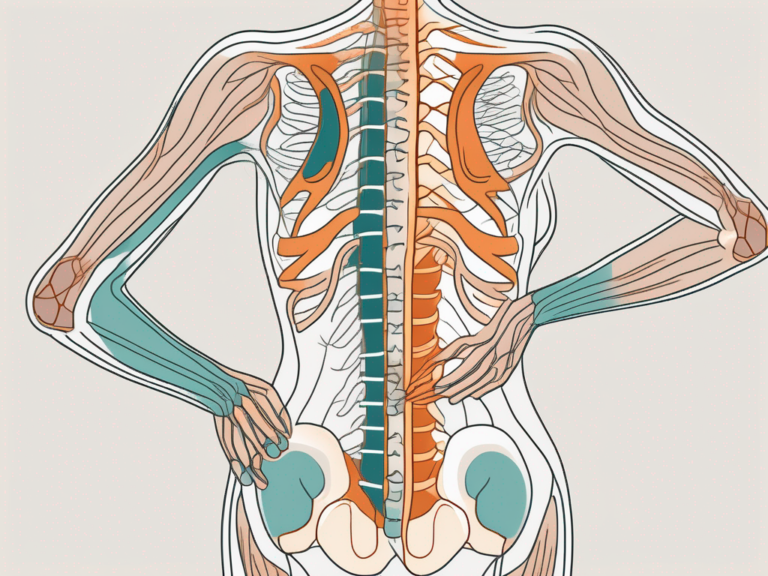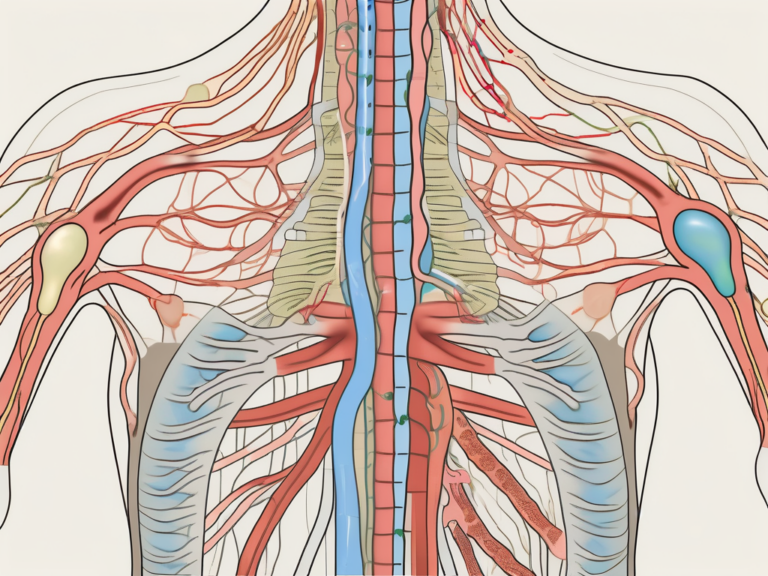What Type of Doctor Should You See for a Sacral Nerve Block?
If you are considering a sacral nerve block, you may be wondering which type of doctor you should consult. It’s important to find a healthcare professional who specializes in this procedure and has experience in managing sacral nerve pain. In this article, we will explore different types of doctors involved in sacral nerve blocks, factors to consider when choosing a doctor, and what to expect during and after the procedure.
Understanding Sacral Nerve Block
Before diving into the specifics, let’s first understand what a sacral nerve block is. A sacral nerve block is a minimally invasive procedure that aims to relieve pain in the sacrum, which is the triangular bone at the base of the spine. This procedure involves injecting a local anesthetic and sometimes a corticosteroid into the nerves in the sacral area to block pain signals.
The sacrum plays a crucial role in supporting the weight of the upper body and transferring it to the lower limbs. It is made up of five fused vertebrae and connects the spine to the pelvis. Due to its location and function, the sacrum is susceptible to various conditions that can cause pain and discomfort.
What is a Sacral Nerve Block?
A sacral nerve block is a therapeutic procedure used to diagnose and treat pain related to the sacral nerves. It is commonly performed for conditions such as sacroiliac joint dysfunction, chronic lower back pain, and sciatica. By numbing the nerves in the sacral area, a nerve block can provide temporary or long-lasting pain relief. It can also help identify the source of the pain.
Sacroiliac joint dysfunction is a condition in which the sacroiliac joints, which connect the sacrum to the pelvis, become inflamed or irritated. This can cause pain in the lower back, buttocks, and legs. Chronic lower back pain is a persistent discomfort in the lower back that lasts for more than three months. It can be caused by various factors, including muscle strain, herniated discs, and spinal stenosis. Sciatica refers to pain that radiates along the sciatic nerve, which runs from the lower back down the back of each leg.
Conditions Treated by Sacral Nerve Block
Sacral nerve blocks are commonly used to treat various conditions, including:
- Sacroiliac joint dysfunction: This condition can cause significant pain and limited mobility. A sacral nerve block can help alleviate the discomfort and improve the patient’s quality of life.
- Chronic lower back pain: Persistent lower back pain can be debilitating and affect daily activities. A sacral nerve block can provide relief and allow individuals to engage in their regular routines with less pain.
- Sciatica: The shooting pain and numbness caused by sciatica can greatly impact a person’s mobility. By targeting the sacral nerves involved in this condition, a nerve block can effectively reduce the symptoms and improve functionality.
- Pelvic pain: Pelvic pain can have various causes, including inflammation, nerve damage, and muscle spasms. A sacral nerve block can help manage the pain and improve the overall well-being of individuals experiencing pelvic discomfort.
- Postherpetic neuralgia: This condition is a complication of shingles, a viral infection that affects the nerves. The persistent pain experienced by individuals with postherpetic neuralgia can be alleviated with the help of a sacral nerve block.
- Endometriosis: Endometriosis is a condition in which the tissue lining the uterus grows outside of it. This can lead to severe pelvic pain. A sacral nerve block can be part of the treatment plan to manage the pain associated with endometriosis.
If you have been diagnosed with any of these conditions and are experiencing significant pain, a sacral nerve block may be recommended by your healthcare provider. It is important to consult with a medical professional to determine if this procedure is suitable for your specific situation.
Different Types of Doctors Involved in Sacral Nerve Block
When it comes to sacral nerve block procedures, there are several different types of doctors involved in the process. Each plays a specific role in ensuring the success and safety of the procedure. Here are the key professionals you may encounter:
Role of a Neurologist
A neurologist specializes in diagnosing and treating disorders of the nervous system, including conditions that may cause sacral nerve pain. They have a comprehensive understanding of the anatomy and function of the nervous system, which helps them identify and manage nerve-related pain.
Neurologists undergo years of rigorous training to become experts in their field. They use advanced diagnostic techniques, such as nerve conduction studies and electromyography, to assess the health and function of the nerves. By carefully analyzing the results, neurologists can pinpoint the source of the pain and determine if a sacral nerve block is an appropriate treatment option.
Furthermore, neurologists work closely with other healthcare professionals, such as radiologists, to interpret imaging studies like magnetic resonance imaging (MRI) or computed tomography (CT) scans. These imaging techniques provide detailed images of the sacral nerves, allowing neurologists to visualize any abnormalities or potential causes of pain.
Role of an Anesthesiologist
An anesthesiologist is responsible for administering anesthesia and monitoring patients’ vital signs during the sacral nerve block procedure. They ensure that patients are comfortable and safely sedated throughout the process. Anesthesiologists are highly skilled in pain management techniques, making them an essential part of the procedure.
Prior to the sacral nerve block, anesthesiologists thoroughly review the patient’s medical history, including any allergies or adverse reactions to anesthesia. This information helps them select the most appropriate anesthesia drugs and dosages for the individual patient. During the procedure, anesthesiologists use their expertise to administer the anesthesia in a precise and controlled manner, ensuring that the patient remains pain-free and relaxed.
Moreover, anesthesiologists are trained in advanced monitoring techniques to ensure patient safety. They continuously monitor vital signs, such as heart rate, blood pressure, and oxygen levels, throughout the procedure. By closely monitoring these parameters, anesthesiologists can detect any potential complications or adverse reactions to the anesthesia and take immediate action to address them.
Role of a Pain Management Specialist
A pain management specialist is a physician who specializes in the evaluation, diagnosis, and treatment of chronic pain conditions. They have extensive knowledge and experience in various pain management techniques, including sacral nerve blocks. Pain management specialists work closely with patients to develop comprehensive treatment plans tailored to their specific needs.
When it comes to sacral nerve blocks, pain management specialists play a crucial role in the overall management of the patient’s pain. They carefully assess the patient’s medical history, perform a thorough physical examination, and review any previous imaging studies to determine the appropriateness of a sacral nerve block. If deemed suitable, the pain management specialist will explain the procedure to the patient, including its potential benefits and risks.
During the sacral nerve block procedure, pain management specialists use their expertise to precisely locate the target nerve and administer the medication. They may use imaging guidance, such as fluoroscopy or ultrasound, to ensure accurate needle placement. By delivering the medication directly to the affected nerve, pain management specialists aim to provide targeted pain relief and improve the patient’s overall quality of life.
Furthermore, pain management specialists are skilled in managing any potential complications or side effects that may arise from the sacral nerve block. They closely monitor patients after the procedure, ensuring their comfort and safety. If necessary, they may recommend additional treatments or therapies to optimize pain relief and promote long-term recovery.
Choosing the Right Doctor for Sacral Nerve Block
When it comes to selecting a doctor for your sacral nerve block procedure, it is crucial to consider several factors that can greatly impact the outcome of your treatment and overall experience. Making an informed decision is key. Here are some key factors to keep in mind:
Factors to Consider When Choosing a Doctor
1. Experience and expertise: Look for a doctor who not only has experience in performing sacral nerve blocks but also possesses extensive expertise in this area. It is essential to find a doctor with a strong track record of successful procedures and positive patient outcomes. Their experience can provide you with confidence in their abilities and increase the likelihood of a successful outcome.
2. Credentials and qualifications: When it comes to any medical procedure, it is crucial to ensure that the doctor you choose is board-certified and has the necessary qualifications to perform sacral nerve blocks. Take the time to check their credentials and certifications to ensure they have received proper training in this specific area. This step will help you feel more at ease, knowing that you are in capable hands.
3. Communication and trust: Building a strong rapport with your chosen doctor is of utmost importance. You should feel comfortable discussing your concerns, asking questions, and expressing your preferences. A good doctor will take the time to listen to you, address your concerns, and create a treatment plan that aligns with your goals and preferences. Trust and open communication are essential for a successful doctor-patient relationship.
4. Referrals and recommendations: Seek recommendations from trusted sources, such as your primary care physician or friends who have undergone similar procedures. Their firsthand experiences can provide valuable insights and help guide your decision. Additionally, you can research online reviews and testimonials to gather more information about the doctor’s reputation and patient satisfaction.
Questions to Ask Your Potential Doctor
During your initial consultation, it is important to ask the following questions to help you assess the doctor’s suitability:
- How many sacral nerve block procedures have you performed? The more experience a doctor has, the more comfortable you can feel with their expertise.
- What is your success rate with this procedure? Understanding the doctor’s success rate can give you an idea of the likelihood of a positive outcome.
- What are the potential risks and complications associated with a sacral nerve block? It is essential to be aware of any potential risks or complications involved in the procedure to make an informed decision.
- What alternative treatment options are available for my condition? Exploring alternative treatment options can help you understand the full range of choices available to you.
- What can I expect during the recovery period? Understanding the recovery process can help you plan and prepare for the post-procedure period.
Remember, the more informed you are about the procedure and the doctor’s expertise, the better equipped you will be to make an informed decision. Take the time to research and consult with multiple doctors to ensure you find the right one for your sacral nerve block procedure.
Preparing for a Sacral Nerve Block Procedure
Pre-procedure Consultation
Prior to the sacral nerve block procedure, you will likely have a consultation appointment with your chosen doctor. During this consultation, they will evaluate your medical history, conduct a physical examination, and discuss your symptoms and treatment goals. This is also an opportunity to address any concerns or questions you may have about the procedure.
During the evaluation of your medical history, your doctor will ask you about any previous surgeries, medical conditions, or allergies you may have. It is important to provide accurate and detailed information to ensure the safety and effectiveness of the sacral nerve block procedure.
The physical examination will involve a thorough assessment of the area where the nerve block will be performed. Your doctor will examine your lower back, buttocks, and pelvic region to determine the optimal location for the injection. They may also perform additional tests, such as nerve conduction studies or imaging scans, to gather more information about your condition.
Once your medical history and physical examination have been completed, your doctor will discuss your symptoms and treatment goals. They will ask you about the intensity and location of your pain, as well as any activities or movements that aggravate or alleviate your symptoms. This information will help guide the placement of the sacral nerve block and ensure that it targets the specific nerves responsible for your pain.
Understanding the Risks and Benefits
It’s important to have a clear understanding of the risks and benefits associated with a sacral nerve block. While the procedure is generally safe, it does carry some potential risks, such as infection, bleeding, nerve damage, or allergic reactions to the medications used. Your doctor will explain these risks to you and help you weigh them against the potential benefits in managing your pain.
Infection is a possible risk of any invasive procedure, including a sacral nerve block. Your doctor will take precautions to minimize this risk, such as sterilizing the injection site and using sterile equipment. They may also prescribe antibiotics before or after the procedure to further reduce the chance of infection.
Bleeding is another potential risk of the sacral nerve block procedure. Your doctor will carefully monitor the injection site for any signs of bleeding and apply pressure if necessary to control it. They may also ask you to avoid blood-thinning medications, such as aspirin or ibuprofen, in the days leading up to the procedure to reduce the risk of excessive bleeding.
Nerve damage is a rare but possible complication of a sacral nerve block. Your doctor will use imaging guidance, such as fluoroscopy or ultrasound, to ensure precise needle placement and minimize the risk of damaging surrounding nerves. They will also use a small amount of local anesthetic to numb the area before inserting the needle, further reducing the chance of nerve injury.
Allergic reactions to the medications used in a sacral nerve block are uncommon but can occur. Your doctor will review your medical history and any known allergies to determine the safest medications to use. They may also perform a skin test prior to the procedure to check for any allergic reactions.
Despite these potential risks, the benefits of a sacral nerve block can be significant for individuals suffering from chronic pelvic pain or conditions such as interstitial cystitis or pudendal neuralgia. By blocking the pain signals from the sacral nerves, the procedure can provide long-lasting pain relief and improve your quality of life.
What to Expect During and After a Sacral Nerve Block
The Procedure Step-by-Step
During the procedure, you will be positioned on your stomach, and the skin over the sacral area will be cleaned and sterilized. Your doctor will use fluoroscopic guidance (real-time X-ray) to accurately place the needle into the appropriate area. They will then inject the medication, which may include a local anesthetic and a corticosteroid, to numb the nerves and reduce inflammation. The procedure usually takes around 30 minutes to an hour, depending on the complexity.
Post-procedure Care and Recovery
After the procedure, you will be monitored for a short period to ensure you’re stable and recovering well. You may experience temporary numbness or weakness in the lower back or legs due to the local anesthetic. Your doctor will provide specific post-procedure instructions to follow, which may include restrictions on certain activities. It’s important to follow these instructions carefully to promote proper healing and minimize potential complications.
Alternatives to Sacral Nerve Block
Other Treatment Options for Sacral Nerve Pain
While sacral nerve blocks can be an effective treatment option for many individuals, they may not be suitable for everyone. Depending on your specific condition and preferences, your doctor may recommend alternative treatment options, such as:
- Physical therapy
- Medication management
- Acupuncture
- Chiropractic care
- Trigger point injections
It’s essential to discuss these alternatives with your healthcare provider to determine the best course of action for your individual needs.
When to Consider Alternative Treatments
While sacral nerve blocks can provide effective pain relief for many individuals, there may be situations where alternative treatments should be considered. Some reasons to explore other options may include:
- Unsuccessful previous sacral nerve blocks
- Contraindications or allergies to the medications used in the procedure
- Preferential consideration for non-invasive or non-pharmacological approaches
Consult with your doctor to determine the most appropriate treatment plan for your specific circumstances.
In conclusion, a sacral nerve block is a specialized procedure that requires the expertise of various medical professionals. When considering a sacral nerve block, it is crucial to choose a doctor with the right experience, qualifications, and ability to address your specific needs. By working closely with your chosen healthcare provider, you can make informed decisions about your treatment options and enhance your chance of successful pain management. Remember, it is always best to consult with a medical professional before starting any treatment plan or procedure.





